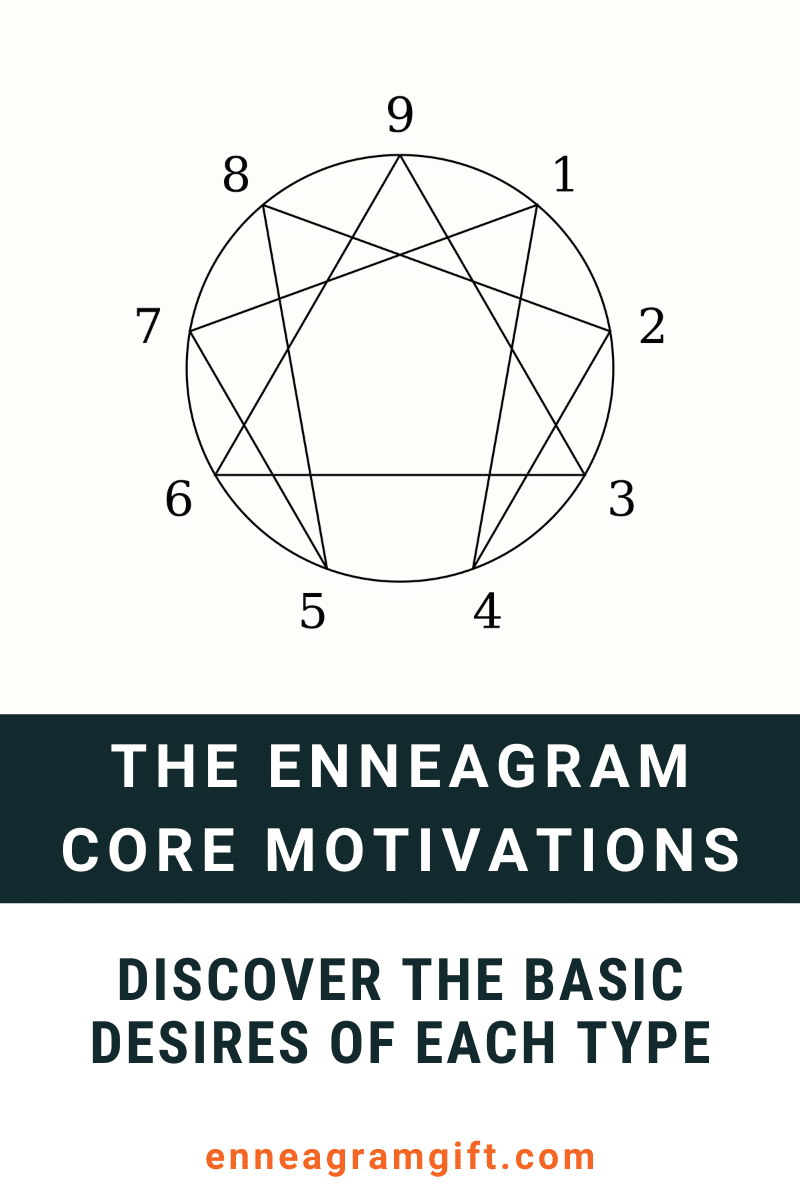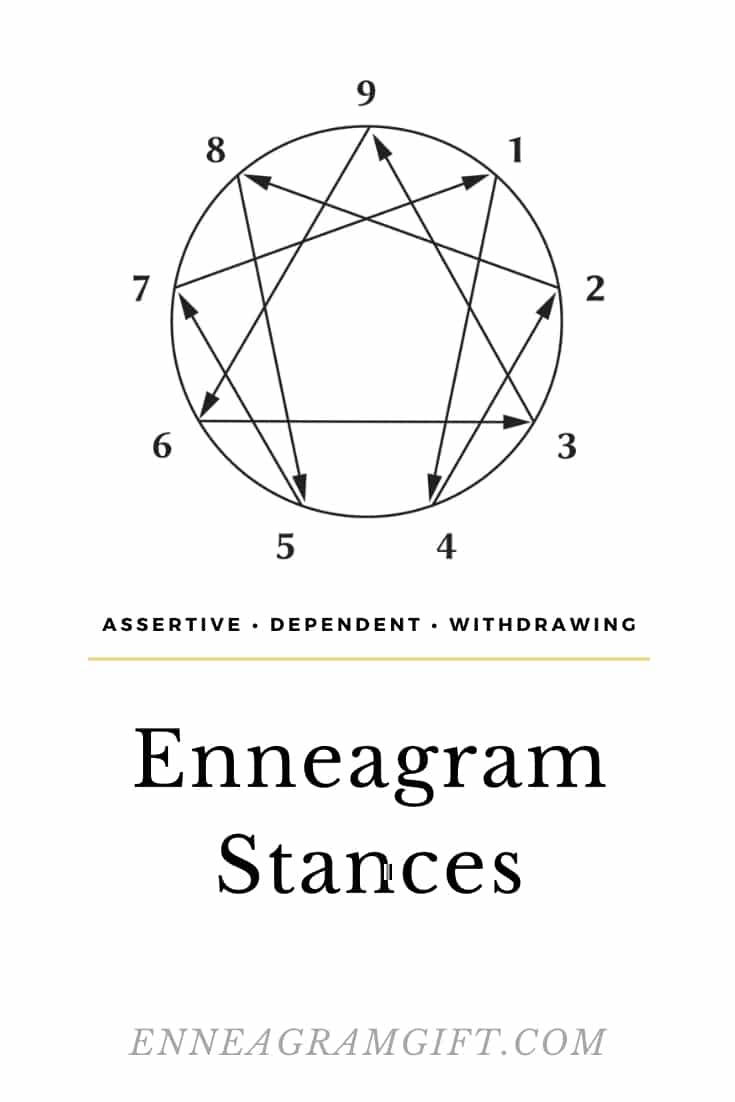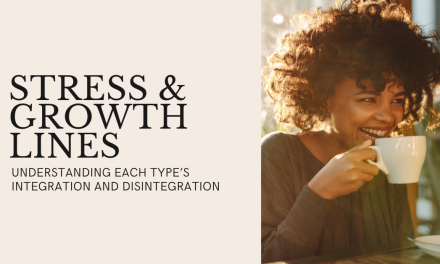The Enneagram motivations associated with each type are unique and are often more helpful for identifying types beyond traits and characteristics. Read on to learn about each Enneagram type and what motivates them. Exploring each type can help you identify what drives people, inspire empathy, and strengthen your relationships.
Understanding human behavior involves underlying motivations underneath the surface. While external concerns, such as money, relationships, careers, conflict, etc., can play a role in behavior, exploring a person’s motivations can reveal more about how people handle and regulate themselves and their relationships. It can also help someone better understand why some habits and patterns seem to reoccur in one’s life.
All 9 Enneagram personality types each have their own set of patterns and behaviors recognizable within their type. The core motivation of each enneagram type is distinctly different. Understanding these motivations and how they can influence personality and behavior can explain why each type responds the way they do.
Why Are The Enneagram Motivations Of Each Type Important?
It is common for people to identify with multiple enneagram types because it is true that everyone can exhibit characteristics of each type. Understanding the motivations of each type can help distinguish the fundamental differences among the types and help individuals more quickly determine their enneagram type.
The Enneagram is a tool for understanding human personality beyond quirks and traits; it also provides insight into underlying motivations associated with each of the nine personality types. The motivations of each personality strongly connect to basic fears of the type and are in direct contrast with one another.
The motivations of each type, along with other traits, develop in stages of childhood based on several factors, including wounding messages received from important authority figures.

4 Benefits Of Understanding The Core Motivations Of Each Enneagram Type
- Enneagram motivations help explain why specific characteristics exist
- Insight into the core motivations of each Enneagram type can promote empathy
- Exploring enneagram motivations can help individuals identify their type
- Relating to your motivations can help empower you to overcome self-defeating behaviors
The motivations of each type strongly influence behavior during times of stress or growth and social situations. Gaining insight into the motivations and fears of each type provides a powerful opportunity for increasing empathy, compassion, and understanding for oneself and others.
Enneagram Core Motivations & Fears Of Each Type
Enneagram 1 Motivation
Enneagram Type 1’s are perfectionists by nature and strive to be correct through constant self-improvement and critique. Their drive to be good is in hopes of preventing others from perceiving them as inherently wrong or imperfect. A one’s effort to be good stems from a basic fear of being defective and a nagging belief that it is not ok to make mistakes.
Enneagram 1 Core Motivation: to have integrity, full of virtue, and correct
Enneagram 1 Core Fear: to never be good enough
A 1’s drive can help them create order and be effective at what they do. On the contrary, it can also bring about an unhealthy obsession with being perfect.
Enneagram 2 Motivations
Enneagram Type 2’s are helpers that see every person they meet as an opportunity to assist others. They are motivated by a fundamental desire to feel wanted and worthy of love, which they also hope to receive by being available and helpful to others. 2’s fear of being unloved and left alone in life can create unhealthy habits concerning attempts to build relationships.
Enneagram 2 Core Motivation: to feel appreciation, love, and desirable
Enneagram 2 Core Fear: to never be worthy or important enough
The two’s motivations can help them be empathetic and kind-natured but can also lead to them not being mindful of their other needs.
Enneagram 3 Motivations
Enneagram Type 3’s are achievers who pour their energy into accomplishing high goals for themselves. In their desire to be admired and valued by others, they will try their best to prove that they deserve it in any way they can. A three’s effort to succeed results from their fear that others will consider them worthless if they lack accomplishments.
Enneagram 3 Core Motivation: to be admirable, successful, and respected
Enneagram 3 Core Fear: to be worthless and lack value
3’s can be inspiring role models to others but can also lose their sense of identity in their pursuit to impress others.
Enneagram 4 Motivations
Enneagram Type 4’s are individualists that work hard at expressing themselves and presenting a highly creative identity. They feel a strong motivation to create a unique and inspiring sense of identity. On the opposite end, they fear not finding their own identity and lacking significance or meaning.
Enneagram 4 Core Motivation: to be possess meaning, significance, and authenticity
Enneagram 4 Core Fear: to be unseen, ordinary, and common
4’s can create a meaningful life but feel alone and ostracized from others when lacking awareness, resulting in bitterness towards themselves and others.

Enneagram 5 Motivations
Enneagram Type 5’s are investigators that dedicate their time to developing themselves and their ideas to create independence and competency. Motivated by their need to feel capable and strong, they will develop skills to prevent actual or perceived threats. They fear that they will fail, leaving them incapable and unable to help themselves or others.
Enneagram 5 Core Motivation: to be competent, capable, and sufficient
Enneagram 5 Core Fear: to require help
5’s can offer significant contributions to the world but can also become lost in their independent path, becoming isolated and detached from others.
Enneagram 6 Motivations
Enneagram Type 6’s are loyalists who devote themselves to the people and groups they identify with and trust. Motivated by a need to feel secure and supported in life, they will work hard to be a part of friendships and groups that are meaningful to them. They fear being unsupported and having to live their lives without sufficient guidance.
Enneagram 6 Core Motivation: to be secure, safe, and supported
Enneagram 6 Core Fear: to lack guidance and direction
6’s can be reliable team players but can also be indecisive and unsure.
Enneagram 7 Motivations
Enneagram Type 7’s are enthusiasts that try to enjoy the world around them to its greatest extent. Motivated to fulfill their pleasures and needs, they will exhaust and explore every opportunity. They fear missing out on their needs being fulfilled and experiencing pain.
Enneagram 7 Core Motivation: to be happy, without restraints, and open to possibilities
Enneagram 7 Core Fear: to feel painful emotions, limitations, and missing out
7’s can channel their energy into productivity and success but can also lack discipline and fall into impulsivity when making choices.
Enneagram 8 Motivations
Enneagram Types 8’s are challengers that feel comfortable imposing their will on others and their surroundings. They are motivated to control and protect themselves from outside influences. They fear being controlled by others and being hurt by their vulnerability.
Enneagram 8 Core Motivation: to be independent, able to protect themselves and others, and free to make decisions
Enneagram 8 Core Fear: to be weak, vulnerable, and without power
8’s can use their strength to improve the lives of others but can also be confrontational in even simple matters.
Enneagram 9 Motivations
Enneagram Type 9’s are peacemakers that hope to reduce turbulence in their lives and promote peace. Their inner motivation is to maintain stability and calm their conflict-adverse minds. The primary fear of 9’s is experiencing loss or disconnection from those they love.
Enneagram 9 Core Motivation: to be at peace, stable, and connected with others
Enneagram 9 Core Fear: to experience conflict, suffering loss, and tension
9’s can be great problem-solvers and delegates but can also ignore their own needs to serve the interests of others.

Enneagram Motivations Conclusion
Paying attention to the motivations of each enneagram type, particularly your own, is an insightful way to notice when and why particular behaviors or thoughts are occurring. When mindful, the motivations of each type are powerful drivers for positive change and growth; however, when lacking awareness, these desires can cause every type to spiral into unhealthy patterns as well.
If you want to explore the Enneagram further or gain a deeper understanding of each type, check out the post: The Helpful Enneagram Guide To The System, 9 Types, & Tests. The framework of the Enneagram helps explore the thoughts, behaviors, and motivations of each personality to identify healthy alternatives to damaging patterns.
If you are unsure of your type and need tips for determining which Enneagram number you identify with the most, visit the post: Learn How to Find Your Enneagram With 4 Helpful Tips.





